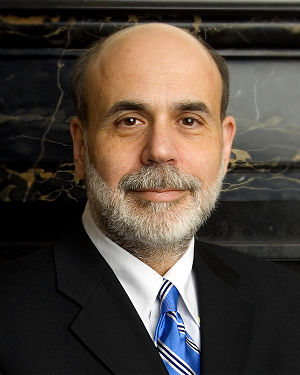| Official portrait of Federal Reserve Chairman Ben Bernanke. (Photo credit: Wikipedia) |
Washington, Jul.11, investment opportunities .- Many Federal Reserve members agreed last month that the job market's improvement would have to be sustained before the Fed would reduce its bond purchases, according to minutes of their June meeting. Several felt confident that a pullback in bond purchases could occur soon.
The minutes released Wednesday echo remarks Chairman Ben Bernanke made at a news conference after the meeting. Bernanke said the Fed would likely slow its bond purchases later this year and end them around mid-2014 if the economy continued to strengthen. The bond purchases have helped keep long-term interest rates low to spur spending.
Since the purchases began in September, the economy has added an average 204,000 jobs a month, up from 174,000 jobs in the previous nine months. Still, unemployment remains a high 7.6 percent.
The minutes showed that Fed members struggled with how best to convey the Fed's thinking about its timetable for bond purchases. Some wanted to explain it in the post-meeting statement. Others felt the statement might be misinterpreted. In the end, most participants thought Bernanke should lay out the Fed's thinking in his news conference _ and stress that any pullback in bond purchases would depend on the economic outlook.
Bernanke stressed at the news conference that if the economy weakens, the Fed wouldn't hesitate to step up its bond purchases again. Still, stocks and bonds plunged after his remarks, and interest rates surged.
Several Fed members helped steady stock markets in the days that followed by noting that any pullback in bond buying would hinge on the economy's health, not a target date. Stocks have since regained most of their losses, in part because of encouraging data about the job market and corporate earnings.
Each month since late last year, the Fed has been buying $85 billion in Treasury and mortgage bonds. The bond purchases have kept long-term rates near record lows. Ultra-low rates encouraged more Americans to buy homes and cars, fueled economic growth and cheered the stock market.
Investors worried that once the Fed starts scaling back its bond buying, home loans would start to cost more, corporations would pay more to borrow and bond investors would be squeezed.
But steady job gains have raised the likelihood that the Fed will announce after its September meeting that it's reducing its bond purchases.
Still, economist growth has been subpar. The economy grew at an annual rate of just 1.8 percent in the January-March quarter. Economists think growth stayed below a 2 percent annual rate in the April-June quarter. If so, it would mark a third straight quarter of weak growth.
Most think growth will pick up in the second half of the year but stay around 2 percent for the year.
The Fed's forecasts are rosier: It predicts growth of 2.3 percent to 2.6 percent this year and more than 3 percent in 2014. It also expects unemployment to fall as low as 7.2 percent by the end of this year and as low as 6.5 percent by the end of 2014.
Many analysts think the Fed could begin slowing its bond purchases from $85 billion a month to around $65 billion in September and gradually shrink them before ending them by next summer. That would likely happen, though, only if the job market and the economy continued to strengthen. Bernanke has said the bond-buying would end when the unemployment rate would be around 7 percent. It's now 7.6 percent.
Even after it scales back its bond purchases, the Fed will still be providing considerable support to the economy. That's because it plans to keep its investment holdings _ now at a record $3.4 trillion _ constant to avoid causing long-term rates to rise too quickly. The end of the bond program would mean only that the Fed's balance sheet would no longer be growing.
The Fed has also said it plans to keep short-term rates at record lows at least until unemployment slides to 6.5 percent. And Bernanke has emphasized that 6.5 percent unemployment is a threshold, not a trigger: The Fed might decide to keep its benchmark short-term rate near zero even after unemployment falls that low.


No comments:
Post a Comment